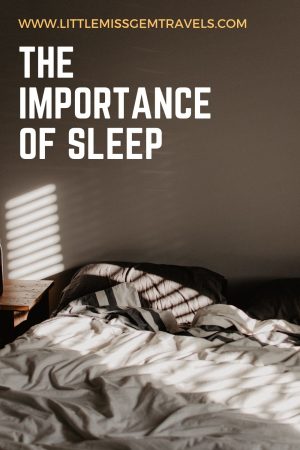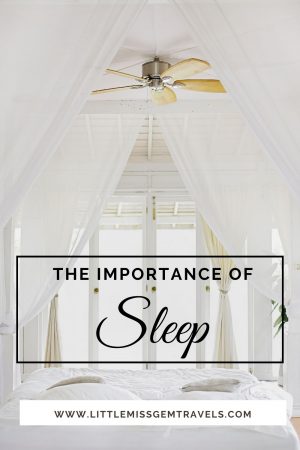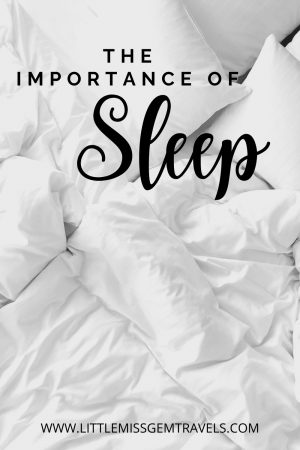The posts in this blog may include affiliate links. This means that when you decide to purchase anything through these links I get a small commission at NO extra cost to you.
Did you know that we spend about a third of our lives asleep? The importance of sleep to our bodies is as necessary as eating, drinking and breathing, it is vital for maintaining our physical and mental health. Sleep and health go hand in hand; poor sleep can increase the risk of poor health, and poor health can make it harder to sleep. Disturbances in sleep patterns can be one of the first signs of stress, anxiety or depression, it can also affect mood, energy levels, and our ability to concentrate and function during the day.
I have always been effected by my sleep patterns. Too many late nights can make it difficult for me to wake up and function in the mornings, stress and anxiety can mean I spend hours tossing and turning, long lie-ins can cause headaches and a feeling of lethargy and nausea. I have learnt over the years how to spot the signs that tell me to adjust my day and night-time behaviours and the best ways to fix the problems.
We can all benefit from improving the quality of our sleep. For many people it might simply be a case of making some small adjustments to help us sleep better.
The Importance of Sleep
Environment
Your bedroom should be a place that is associated with sleep, with as few distractions as possible. This will allow you to relax with no distractions in your bedroom (I should confess that the TV in my bedroom is probably the biggest cause of my late nights.)
Avoid the presence of gadgets and electronics, such as computers, phones and tablets. The backlit ‘blue light’ displays suppress melatonin production – the hormone that helps you sleep. Most medical advices suggest that you should stop using electronic devices two hours before you go to sleep. I don’t always do this but I do keep my phone switched off and in a different room at night. It is only used as an alarm clock when I actually travelling.
Other common factors that can affect our sleep are light, noise and temperature. If you have sources of light and noise such as light from a street lamp or noise from a neighbour’s music, you might want to use an eye mask or ear plugs. A heater or thicker duvet can help if you regularly find yourself too cold at night; a thinner cover or opening a window can help if you’re too hot.
Health
Physical health problems can easily stop you from getting a good night’s sleep. If you suffer from colds or headache, breathing problems or other medical conditions that cause aches and pains, these will all have an impact. There may be an appropriate medication that could help with this. However, you should always speak to your GP or a pharmacist before taking any medication as some may actual have an adverse effect and cause more issues with your sleep pattern.
Mental health problems like anxiety and depression can also affect our sleep. There can be a vicious circle linking the two; the lack of sleep can result in anxiety, lying awake in bed worrying about something can make it harder for us to get to sleep.
Here are some quick tips to help improve your sleep:
- Don’t Nap
If you have trouble sleeping, you may be tempted to take a nap. However, this usually does more harm than good as it can make it more difficult to sleep later at night. However, a nap might be the best solution if you are driving or operating machinery. If you feel tired during the day, get up and take a walk, get some fresh air, or have a bite to eat.
- Exercise
Eating a more healthy diet and getting regular exercise are great ways of sleeping better. Try to plan your day so that you don’t exercise or eat a large meal within 3 hours of going to bed, these can raise your energy levels and make it more difficult for you to doze off later.
- Don’t Just Lie There
If you find it difficult to get to sleep, don’t just lie there worrying. Get up for a few minutes and get a drink (warm milk can be a great option), then go back to bed. Long lie-ins can also be a bad idea. If you wake up, get up.
- Switch Off
Switch off all gadget at least one hour before you want to drop off to sleep. There’s no harm in using your phone as an alarm for the morning but don’t be tempted to read and answer messages or scroll through social media.
The Importance of Sleep When Travelling
Having an adequate amount of hours worth of sleep is essential for the health and well-being of human bodies. With so many possible reason why our sleep can be disturbed it is of utmost importance to sleep well especially at the time when you are travelling.
I personally have never had a problem sleeping when I travel.
This may be because I follow a few very simple rules when I am away from home:
Alcohol and Caffeine in Moderation:
I never feel any adverse effects from caffeine so rarely worry about drinking too much, but if you find large amounts keep you awake for long periods of time I would probably avoid it, especially if you’re heading off on a long flight. Alcohol is also something you should be mindful of. Drinking to excess and then suffering from a hangover whilst you’re meant to be enjoying an incredible trip away is a huge mistake.
Adjust to the Local Time
When you travel between countries you may suffer with jet lag from crossing different time zones. The solution is to change your watch to the local time zone as soon as you arrive and resist the urge to take a nap, this will make a huge difference to you later on when it time to go to bed. You should also try to eat and exercise the same time every day, just as you would if you were at home.
Pack a Couple of Essentials:
- Sleep Mask
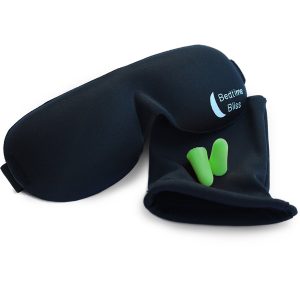 It is often said that a sleep mask can help travellers adjust to different time zones and reduce problems associated with jetlag. I don’t know whether this is an absolute for everyone as I have never taken a long haul flight or one overnight. I have however used a sleep mask on a couple of occasions to simply block out some of the unwanted lights from overhead.
It is often said that a sleep mask can help travellers adjust to different time zones and reduce problems associated with jetlag. I don’t know whether this is an absolute for everyone as I have never taken a long haul flight or one overnight. I have however used a sleep mask on a couple of occasions to simply block out some of the unwanted lights from overhead.
- Earplugs
I know a lot of people who will never go anywhere without their little earplugs in their pockets. I personally don’t like them, for the same reason I don’t like noise-cancelling headphones. I don’t like my sense of hearing being blocked to quite such an extent; I find it weirdly unnerving.
- Neck pillow
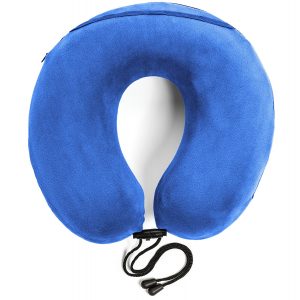 A neck pillow is a great option to avoid discomfort while sleeping a sitting position, it will also save you from the embarrassment of your head falling on a stranger’s shoulder. There are a wide variety of travel pillows so find the one that works for you and take it on all your future trips.
A neck pillow is a great option to avoid discomfort while sleeping a sitting position, it will also save you from the embarrassment of your head falling on a stranger’s shoulder. There are a wide variety of travel pillows so find the one that works for you and take it on all your future trips.
The importance of sleep when travelling is massive, but with good planning and by packing the correct essentials you will manage to have the perfect amount of sleep and a fantastic travelling experience.
Books to Help You Sleep
The Effortless Sleep Method
 The Effortless Sleep Method is the book insomniacs all over the world have been waiting for, even those for whom ‘nothing ever works’. This highly practical and hugely effective method offers a simple and permanent solution for long-term and new insomniacs alike.
The Effortless Sleep Method is the book insomniacs all over the world have been waiting for, even those for whom ‘nothing ever works’. This highly practical and hugely effective method offers a simple and permanent solution for long-term and new insomniacs alike.
The Effortless Sleep Method gives you something no other insomnia book can – an entirely different way of looking at insomnia. The step-by-step insomnia recovery contained in this book doesn’t just treat insomnia, it totally undermines it. This is not another dry as dust reference book written by a doctor, but a lively, empowering book which connects the sufferer intimately to one who has gone through the same pain.
The ability to sleep soundly, naturally and unaided is the desire of every chronic insomniac. This course book will guide you to rediscovering your innate ability to sleep without pills, potions or external sleep aids. When The Effortless Sleep Method is followed properly, the results can be incredible. Many people report sleeping better than they have ever done.
Now, anyone really can have perfect sleep.
The Sleep Book
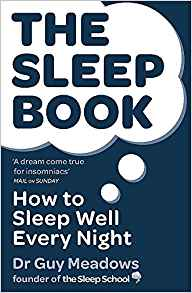 A third of the population sleep badly, but now THE SLEEP BOOK’s revolutionary five-week plan means that you don’t have to be one of them.
A third of the population sleep badly, but now THE SLEEP BOOK’s revolutionary five-week plan means that you don’t have to be one of them.
Using a blend of mindfulness and new ACT therapy techniques, Dr Guy shares his unique five-week plan to cure your sleep problem whether it’s a few restless nights or a lifetime of insomnia. Most people who have trouble sleeping invest a huge amount of time, effort and money into fixing the problem, but Dr Guy has discovered the secret lies not in what you do, but what you learn not to do. In fact, as you will have discovered, the more frustrated you become only serves to push sleep further away.
Dr Guy’s pioneering methods at The Sleep School clinic have been an unprecedented success. By popular demand, his highly effective and 100% natural insomnia remedy is now here in this book. THE SLEEP BOOK is the sum of a doctorate degree in sleep and well over 12,000 hours spent working with more than 2,000 insomniacs in one-to-one clinics, workshops and retreat environments.
Say goodbye to the vicious cycle of sleepless nights. Sleep well, maintain a positive outlook and restore the quality of life you deserve – for good.
Why We Sleep
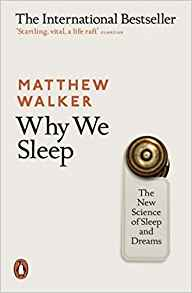 Sleep is one of the most important aspects of our life, health and longevity and yet it is increasingly neglected in twenty-first-century society, with devastating consequences: every major disease in the developed world – Alzheimer’s, cancer, obesity, diabetes – has very strong causal links to deficient sleep.
Sleep is one of the most important aspects of our life, health and longevity and yet it is increasingly neglected in twenty-first-century society, with devastating consequences: every major disease in the developed world – Alzheimer’s, cancer, obesity, diabetes – has very strong causal links to deficient sleep.
In this book, the first of its kind written by a scientific expert, Professor Matthew Walker explores twenty years of cutting-edge research to solve the mystery of why sleep matters. Looking at creatures from across the animal kingdom as well as major human studies, Why We Sleep delves into everything from what really happens during REM sleep to how caffeine and alcohol affect sleep and why our sleep patterns change across a lifetime, transforming our appreciation of the extraordinary phenomenon that safeguards our existence.
What tips do you have to help you sleep while travelling?
Let me know in the comments.
New Post Notifications



